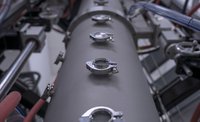When TCT Hall of Famer Greg Morris was asked what it was that convinced GE Aviation to commence series production of the LEAP fuel nozzle, he answered, 'Cobalt-Chrome'.
Up until the release of that superalloy for powder-bed fusion, the technology's material choice was limited; alloys would corrode, stress, and crack. Over the last decade, the choice of the material for Metal Additive Manufacturing has expanded, but slowly.
The paucity of materials for metal additive manufacturing is undeniably a rate-limiting step for series production, and it is a vicious circle; a slower demand means less material development, fewer materials developed means less adoption. Reasons for lack of development are numerous but they mostly include cost and time; the cost of producing the material from scratch, and time to certify.
A new company set to make their debut at Formnext (November 19-22, 2019, Hall 12, Stand E22), is looking to break the vicious circle putting to use a technology honed over several years in what they are calling the most sustainable approach to additive materials production.
6K's UniMelt microwave plasma platform is capable of converting certified chemistry machined millings, turnings and other recycled feedstock sources into premium AM-ready metal powder.
"If the AM industry is to succeed in expanding to a far greater number of parts and market applications, powder production technology has to advance to provide a far stronger business case," commented Aaron Bent, CEO at 6K in a press statement. "Part of enabling that expansion will come from a lower total cost structure and higher performance powders, both of which are possible with 6K's process. But we need to go beyond that, to powders and business models that consider the full production cycle cost of building AM parts."
6K has developed a process technology that today can produce premium powder from certified machining turnings and previously used powders, and in the future extend its capability to feedstock created from AM support structures, non-conforming AM parts post-print, and other unique inputs. The goal is to use 100% of the materials that enter the supply chain, providing AM end-users a new way to manage project costs and control supply chain, while also advancing progress toward a circular economy in AM.
"You know, it is a little secret in powder production," Aaron told TCT in an interview. "Gas atomised powders are at least 50% of the cost comes from the yield loss of powder. We can not only reduce the losses in the production efficiency but go way beyond that and make use of all the other parts in the additive process. If you talk to superusers running several metal machines, they get to a certain point where they can't print anymore. Because they don't mix batches of powders, the material becomes junk for them and they get a couple of dollars per pound. We can combine those batches, run them through a UniMelt and create a new heat to make fresh powder."

6K's powder products are the combination of two core technologies:
1. 6K Alloy Reclamation technology: ability to reclaim metals and alloys from subtractive manufacturing and other operations. The 6K Additive team is already reclaiming and selling over 500 tons of Ti-64 per year into the aluminium alloying industry for aerospace, medical, and automotive products. This provides an engineered feedstock for Amastan's UniMelt plasma for a wide continuum of alloys.
2. 6K UniMelt plasma system: the world's only microwave production scale plasma, with a highly uniform and precise plasma zone with zero contamination, and capable of high throughput production of advanced battery powders, phosphors, AM materials, and more.
"Our ability to reclaim materials and process almost any type of metal, alloy, or ceramic feedstock into premium powders, puts a powerful tool into the hands of the AM designer," continued Dr. Bent. "This now means that any alloy that is machined has the potential to become powder. Furthermore, we can create new AM powders previously not possible: powders engineered from non-eutectic alloys such as high-entropy alloys, or designer aluminium alloys capable of printing in powder bed fusion systems."
Due to the high uniformity of the microwave plasma, 6K has the ability to produce quality powders that exceed competitive technologies, providing high sphericity, zero porosity, elimination of satellites, and high flowability and tap density. Through its metals reclamation strategy, 6K can specifically target the powder size distribution to the AM process of need: MIM, L-PBF, EBM, DED or Binder-jetting, thus enabling almost 100% UniMelt process yield, as much as 3-4 times higher than gas atomization.
As part of 6K's Launch, it has also announced the rebranding of the company from Amastan Technologies to 6K. This is the latest in a series of strategic initiatives that reflect the company's growth over the last year, including the series B-2 funding of $11M and the acquisition of AI Solutions (now 6K Additive). 6K Additive is a ISO9001 facility, processes over 500 tons of Ti-64 per year, and is in the process of building a state-of-the-art 40,00 square foot production facility for additive manufacturing powders, which is scheduled to open in the first quarter of 2020.
















